Demolition Contractors Carlsbad
Best Demolition Company Near Me in Carlsbad
Receive multiple Demolition Contractors Near Me quotes for your project today! Compare profiles, reviews, accreditations, portfolio, etc... and choose the best offer.
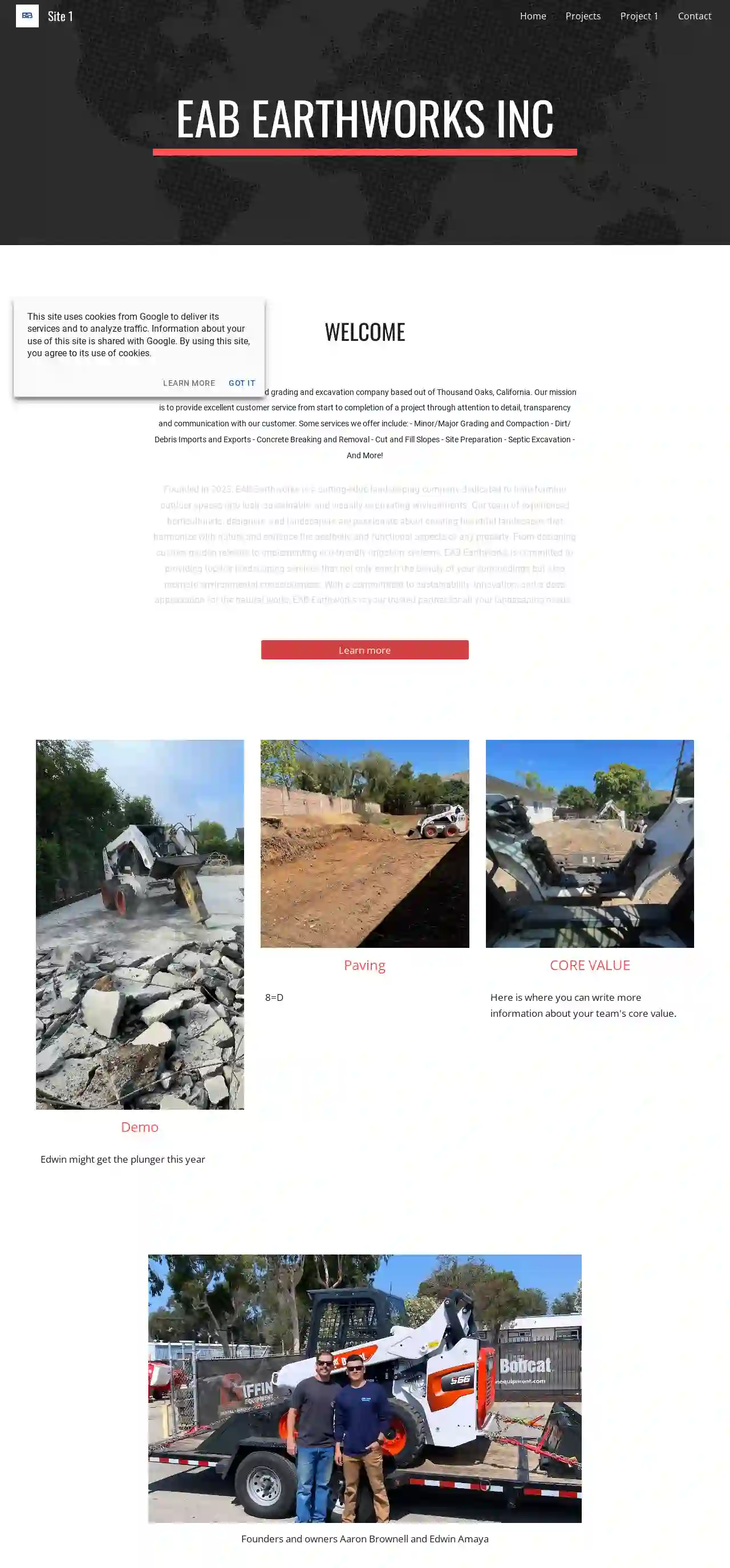
EAB Earthworks Inc.
51 reviewsLos Angeles, US- Services
- Why Us?
Get Quote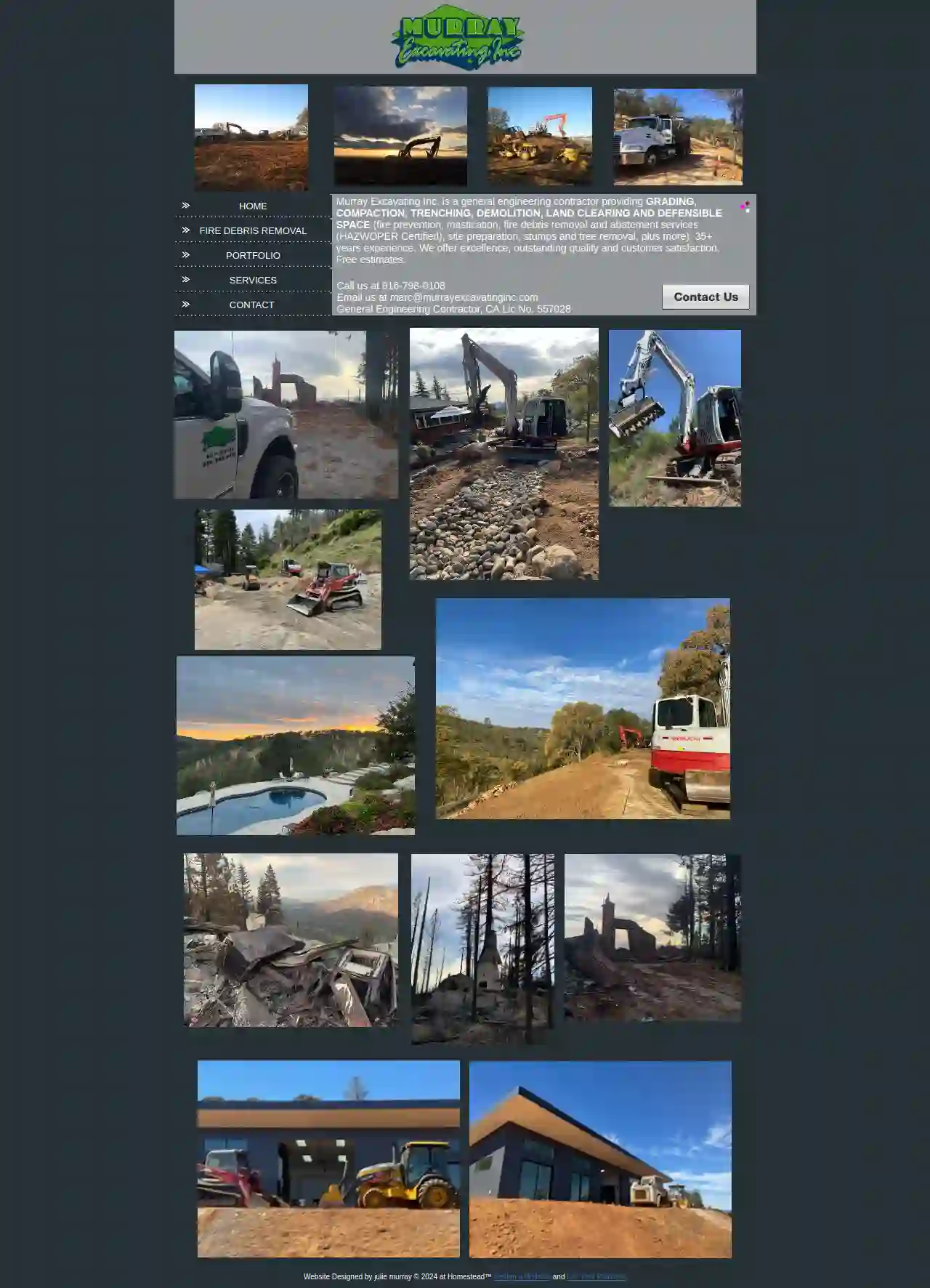
Murray Excavating Inc. Backhoe Service, Excavating and General Engineering Contractor
51 reviewsLatrobe, CA, 95682, USAbout Murray Excavating Inc. Murray Excavating Inc. is a general engineering contractor with over 35 years of experience, specializing in a wide range of services including grading, compaction, trenching, demolition, land clearing, and defensible space preparation. We are committed to providing excellence, outstanding quality, and exceptional customer satisfaction. Our team is HAZWOPER Certified and equipped to handle projects of all sizes, from small residential properties to large-scale commercial developments. We understand the importance of fire safety and have extensive experience in fire debris removal and clean-up. We have worked on major fire events such as the Caldor, Santa Cruz, NAPA, and Paradise Fires, providing comprehensive services that include debris removal, demolition, utility capping, and erosion control. Our goal is to restore your property to a safe and usable condition, while ensuring compliance with all federal and local regulations. Beyond fire-related services, we offer a comprehensive range of solutions for land development and improvement. Our services include brush clearing, mastication, fuel reduction, and land reclamation for various purposes such as recreation, grazing, access, and new construction. We are dedicated to helping you create a safe and sustainable environment for your property. Our team is equipped with a wide range of heavy machinery, including skip loaders, backhoes, excavators, masticators, mowers, dozers, compactors, and 10-wheelers, allowing us to handle any project efficiently and effectively. We are committed to providing our clients with the highest level of service and expertise, ensuring their complete satisfaction.
- Services
- Why Us?
- Gallery
Get Quote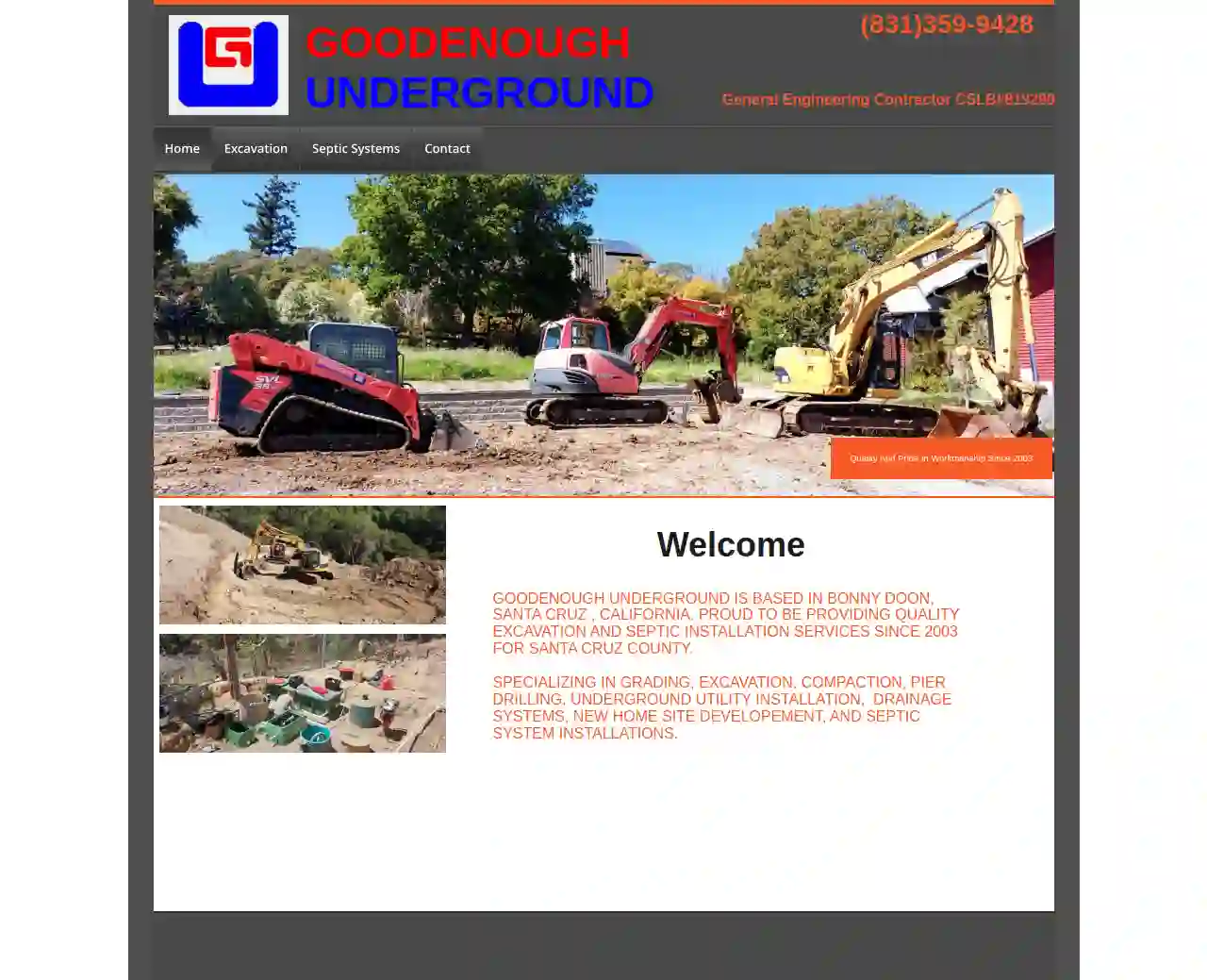
GOODENOUGH UNDERGROUND INC.
57 reviewsBonny Doon, USGOODENOUGH UNDERGROUND IS BASED IN BONNY DOON, SANTA CRUZ , CALIFORNIA. PROUD TO BE PROVIDING QUALITY EXCAVATION AND SEPTIC INSTALLATION SERVICES SINCE 2003 FOR SANTA CRUZ COUNTY. SPECIALIZING IN GRADING, EXCAVATION, COMPACTION, PIER DRILLING, UNDERGROUND UTILITY INSTALLATION, DRAINAGE SYSTEMS, NEW HOME SITE DEVELOPEMENT, AND SEPTIC SYSTEM INSTALLATIONS.
- Services
- Why Us?
- Our Team
- Gallery
Get Quote
Applied EarthWorks
51 reviews1391 W. Shaw Ave., Fresno, 93711, USApplied EarthWorks: Ethical Consultants for Project Success Applied EarthWorks is a company with over 28 years of experience in cultural and paleontological resource management. We are committed to effective and affordable strategies that achieve progress and preservation, working together with our clients to ensure that projects are completed in a way that respects the environment and cultural heritage. We are certified by the California Department of General Services (DGS) as both a Small Business Enterprise (SBE) and a Small Business for Public Works (SB-PW).
- Services
- Why Us?
- Accreditations
- Gallery
Get Quote
Souza Construction & Electric
52 reviews586 So. Farmersville Blvd., Farmersville, 93223, USSouza Construction Inc. is a growing construction business, striving ever forward to become a premier general contractor. From our beginning as a “one-man show”, until our present state as a “multi-faceted” team, one thing has remained constant, a commitment to customer service. It is this commitment that has helped Souza Construction Inc. nearly double its sales every year for the last four years. We firmly believe that it will be this continuing commitment that will assist us in continuing this phenomenal growth pattern. Essential to this excellent service are our capabilities as a builder and a business. THE SOUZA COMMITMENT Souza Construction Inc. has committed itself to recruiting and training leaders in both the construction and professional world. Assembling a team of this caliber is not a quick or simple process, but requires diligent research, highly refined discernment, and continuous assessment. However, it is just this level of commitment and attention to detail that sets us apart. Souza Construction Inc. has made this our primary goal: understanding our customers and their needs, utilizing excellence in the field and in administration, and combining this with an unwavering commitment to customer satisfaction; this is Souza Construction Inc.
- Services
- Why Us?
- Testimonials
- Gallery
Get Quote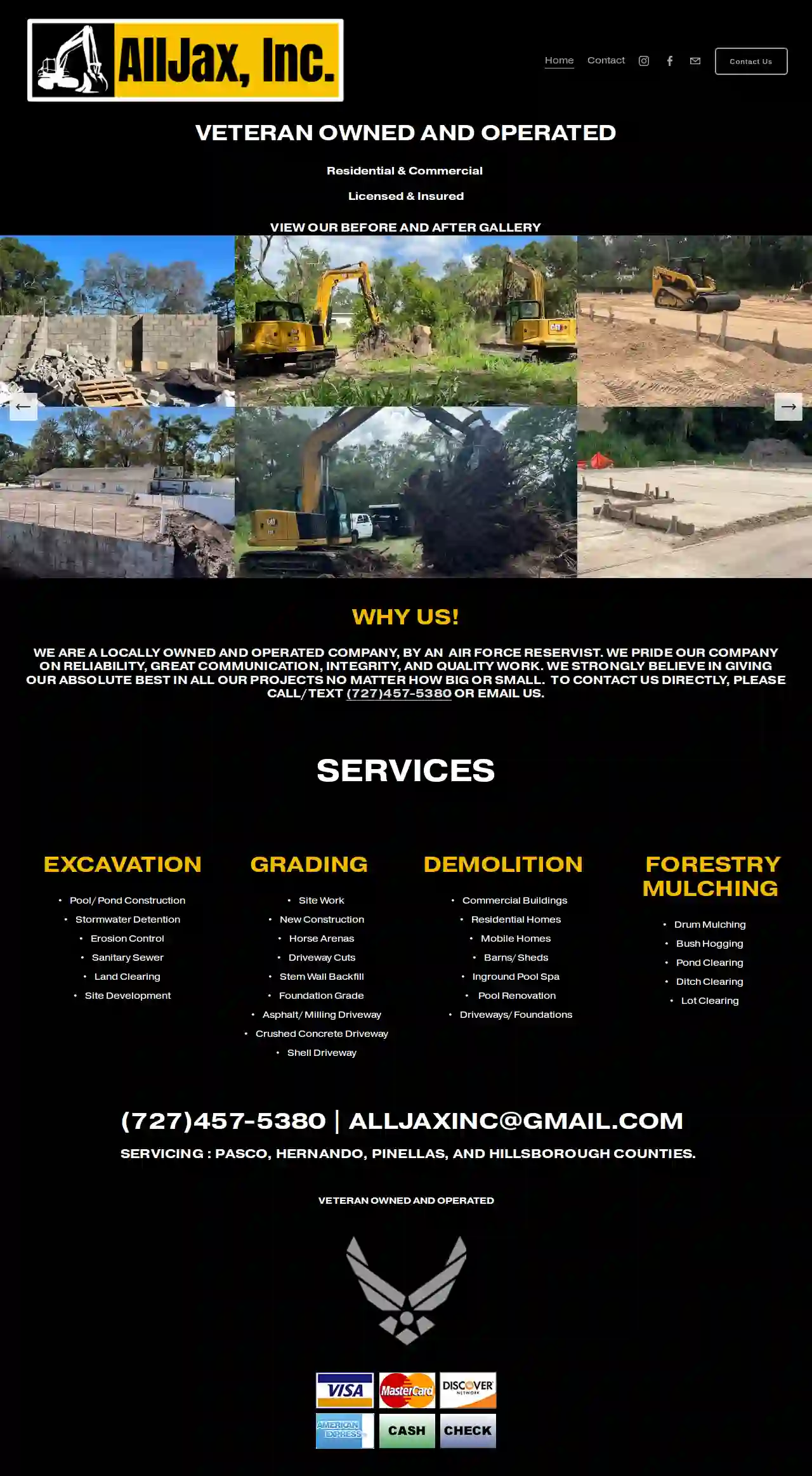
AllJax Inc Excavation, Forestry Mulching & Pond Clearing
4.935 reviewsDavis, USAllJaxInc is a locally owned and operated company, run by an Air Force reservist. We take pride in our reliability, excellent communication, integrity, and high-quality work. We are committed to delivering our best on every project, big or small. We are dedicated to providing exceptional service to our clients in Pasco, Hernando, Pinellas, and Hillsborough Counties. Our team is experienced in a wide range of services, including excavation, pool and pond construction, stormwater detention, erosion control, sanitary sewer, land clearing, site development, forestry, demolition, and grading. We are fully licensed and insured, and we are proud to be a Veteran Owned and Operated business. To contact us directly, please call/text (727)457-5380 or Email Us.
- Services
- Why Us?
- Gallery
Get Quote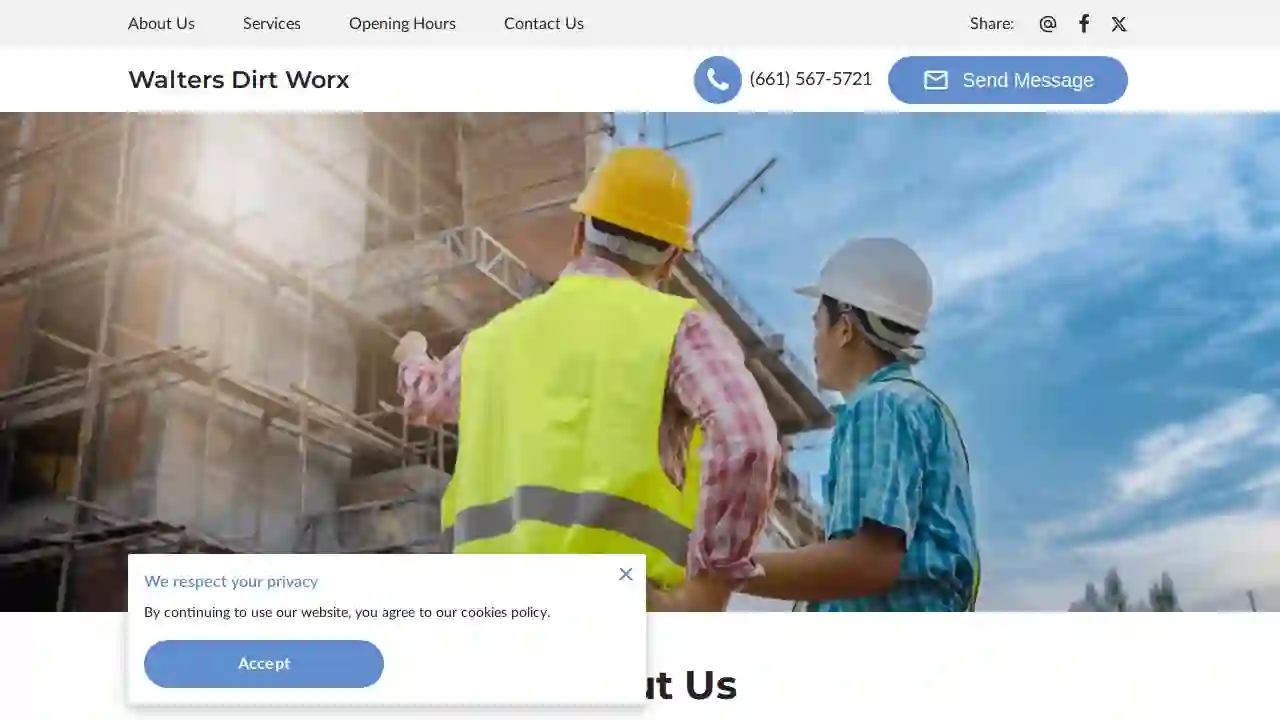
Walters Dirt Worx
1Bakersfield, California, USAbout Us Here at Walters Dirt Worx we offer an exceptional range of construction services in the greater Bakersfield area. From concrete foundation work to excavation, brickwork, and architectural advice, our experienced builders understand the best solutions that work for you. We provide any heavy equipment required work with outstanding results and unbeatable pricing. We’re all dedicated to our roles and work hard to get the job done. Give us a call at +16615675721 so we can discuss any of your construction needs. We always use the highest quality materials during the construction of your outdoor space and our expert designers utilise industry-leading tools. This mix of top equipment and unmatched skill has allowed us to succeed by supplying our clients with services they won’t forget. Not convinced? Think we’re all talk? Read our reviews and get in touch to see what we can deliver. You will not be disappointed. Are you putting together a blueprint for a property or building? If you are, we can deliver expert excavation services to prepare a new build for the foundations and basis of your construction. We understand the demands that are placed on you, so work with your goals in mind to prepare and excavate the land by the most efficient means possible, using a combination of manpower and highly technical heavy-duty vehicles.
- Services
- Why Us?
Get Quote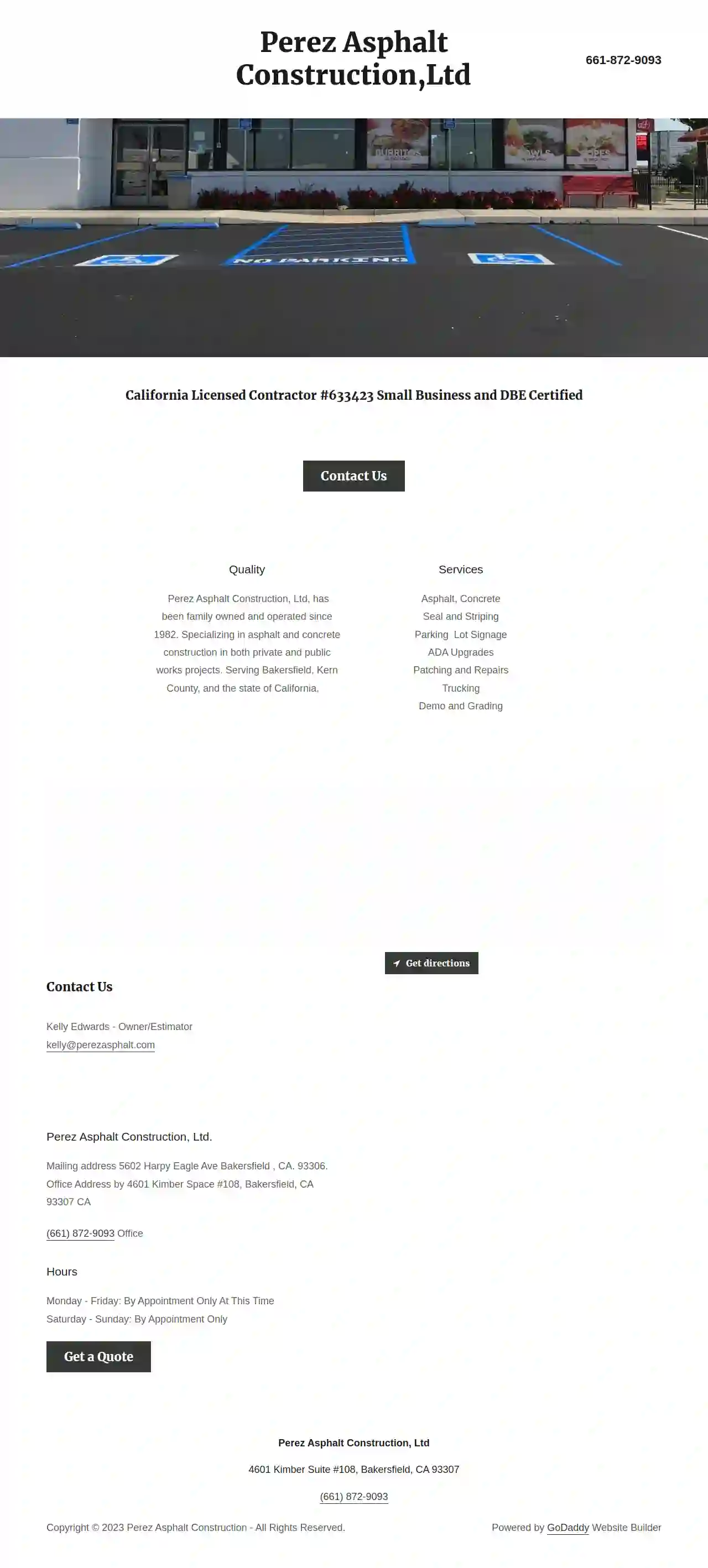
Perez Asphalt Construction
51 reviews5602 Harpy Eagle Ave, Bakersfield, 5602 Harpy Eagle Ave Bakersfield, 93306, USPerez Asphalt Construction, Ltd. Perez Asphalt Construction, Ltd. has been family owned and operated since 1982. We specialize in asphalt and concrete construction for both private and public works projects. Serving Bakersfield, Kern County, and the state of California, we are committed to providing high-quality services that meet your needs. Our team of experienced professionals is dedicated to delivering exceptional results on every project. We use the latest technology and equipment to ensure that your project is completed on time and within budget. Contact us today for a free estimate.
- Services
- Why Us?
- Our Team
Get Quote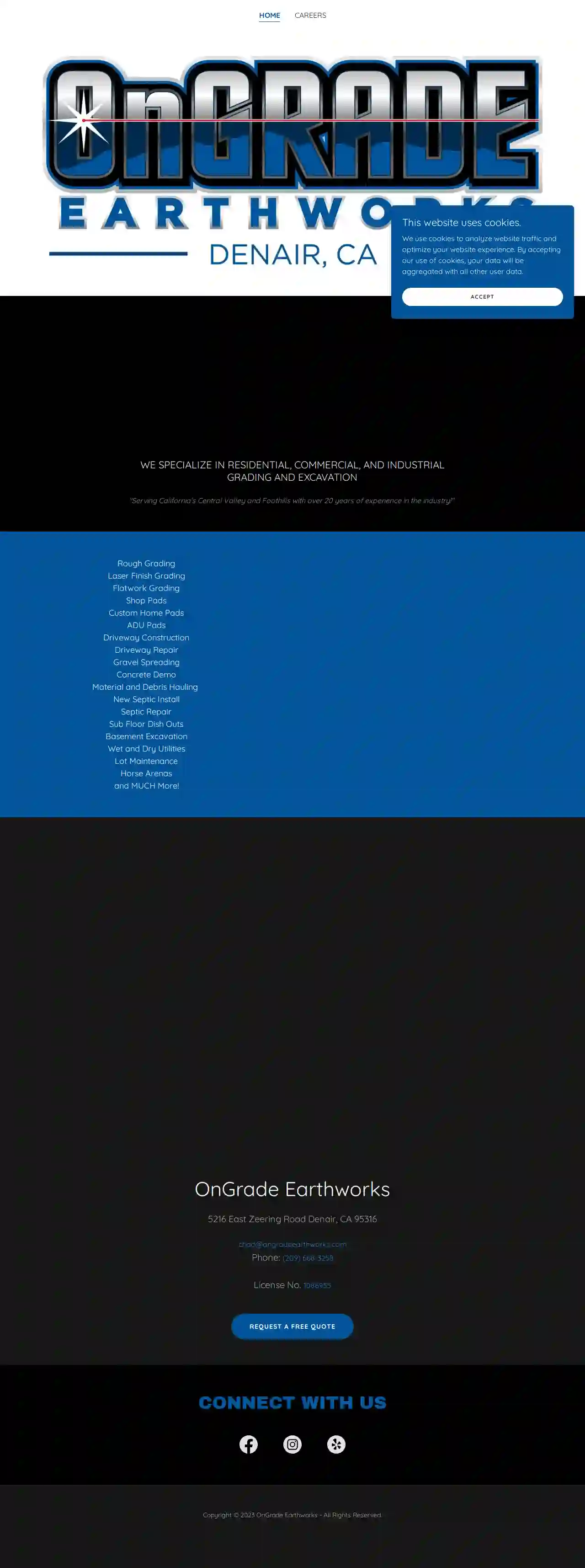
OnGrade Earthworks
15216 East Zeering Road, Denair, 95316, USOnGrade Earthworks We specialize in residential, commercial, and industrial grading and excavation. Serving California's Central Valley and Foothills with over 20 years of experience in the industry! Rough Grading We provide expert rough grading services for a variety of projects. Laser Finish Grading Our laser finish grading services ensure precise and accurate results. Flatwork Grading We offer flatwork grading for driveways, patios, and other areas. Shop Pads We build durable and reliable shop pads for your business. Custom Home Pads We create custom home pads to meet your specific needs. ADU Pads We specialize in building ADU pads for your property. Driveway Construction We construct durable and attractive driveways for your home or business. Driveway Repair We repair damaged driveways to restore their functionality and appearance. Gravel Spreading We provide gravel spreading services for a variety of applications. Concrete Demo We offer professional concrete demolition services. Material and Debris Hauling We handle all your material and debris hauling needs. New Septic Install We install new septic systems for your property. Septic Repair We repair existing septic systems to ensure proper functionality. Sub Floor Dish Outs We provide sub floor dish out services for your project. Basement Excavation We offer professional basement excavation services. Wet and Dry Utilities We handle all your wet and dry utility needs. Lot Maintenance We provide lot maintenance services to keep your property looking its best. Horse Arenas We build and maintain horse arenas for your equestrian needs. Sand We provide sand delivery and spreading services. AND MUCH MORE! We offer a wide range of grading and excavation services to meet your needs.
- Services
- Why Us?
- Gallery
Get Quote
Lowland Grading & Excavation LLC
58 reviewsAberdeen, USPrompt and Reliable We prioritize delivering results swiftly and dependably, all the while ensuring that we meet and exceed the expectations of our clients every time. Satisfaction Guaranteed At our core, we're a seasoned team driven by our expertise and know-how, dedicated to success. We are here to offer you not only ease, but absolute satisfaction.
- Services
- Why Us?
- Gallery
Get Quote
Over 3,943+ Excavation Businesses onboarded
Our excavation experts operate in Carlsbad and surroundings!
ExcavationHQ has curated and vetted Top Excavation Pros in and around Carlsbad. Find a trustworthy pro today.
Frequently Asked Questions About Demolition Contractors
- Project Assessment: The demolition contractor evaluates the structure, site conditions, and project requirements.
- Permitting: Obtain necessary demolition permits from local authorities.
- Site Preparation: Secure the site, disconnect utilities, and remove any valuable or reusable items.
- Hazardous Material Abatement: Professionally remove asbestos, lead paint, or other hazardous materials if present.
- Demolition: Execute the chosen demolition method, bringing down the structure safely and efficiently.
- Debris Removal and Site Cleanup: Sort, process, and dispose of demolition debris responsibly. Clean up the site to prepare it for future use.
- Permits and Regulations: Obtain all necessary demolition permits and comply with local building codes and environmental regulations.
- Contracts: Have a clear and comprehensive contract with the demolition contractor outlining the scope of work, payment terms, and liabilities.
- Environmental Laws: Comply with environmental laws regarding hazardous material removal, waste disposal, and pollution control.
- Neighboring Property Rights: Respect neighboring property rights and take measures to prevent damage or disruption to adjacent properties.
- Worker Safety: Adhere to worker safety regulations and provide a safe working environment for demolition crews.
- General Liability Insurance: Covers bodily injury or property damage to third parties caused by the contractor's negligence.
- Workers' Compensation Insurance: Provides benefits to workers injured on the job.
- Pollution Liability Insurance: Covers costs associated with environmental contamination caused by demolition activities.
- Professional Liability Insurance: Protects against claims of negligence or errors in professional services, such as demolition planning or consulting.
What are the steps involved in a typical demolition process?
What are the legal considerations for demolition projects?
What is the importance of insurance in demolition projects?
Do I need a permit for demolition?
What are the steps involved in a typical demolition process?
- Project Assessment: The demolition contractor evaluates the structure, site conditions, and project requirements.
- Permitting: Obtain necessary demolition permits from local authorities.
- Site Preparation: Secure the site, disconnect utilities, and remove any valuable or reusable items.
- Hazardous Material Abatement: Professionally remove asbestos, lead paint, or other hazardous materials if present.
- Demolition: Execute the chosen demolition method, bringing down the structure safely and efficiently.
- Debris Removal and Site Cleanup: Sort, process, and dispose of demolition debris responsibly. Clean up the site to prepare it for future use.
What are the legal considerations for demolition projects?
- Permits and Regulations: Obtain all necessary demolition permits and comply with local building codes and environmental regulations.
- Contracts: Have a clear and comprehensive contract with the demolition contractor outlining the scope of work, payment terms, and liabilities.
- Environmental Laws: Comply with environmental laws regarding hazardous material removal, waste disposal, and pollution control.
- Neighboring Property Rights: Respect neighboring property rights and take measures to prevent damage or disruption to adjacent properties.
- Worker Safety: Adhere to worker safety regulations and provide a safe working environment for demolition crews.
What is the importance of insurance in demolition projects?
- General Liability Insurance: Covers bodily injury or property damage to third parties caused by the contractor's negligence.
- Workers' Compensation Insurance: Provides benefits to workers injured on the job.
- Pollution Liability Insurance: Covers costs associated with environmental contamination caused by demolition activities.
- Professional Liability Insurance: Protects against claims of negligence or errors in professional services, such as demolition planning or consulting.